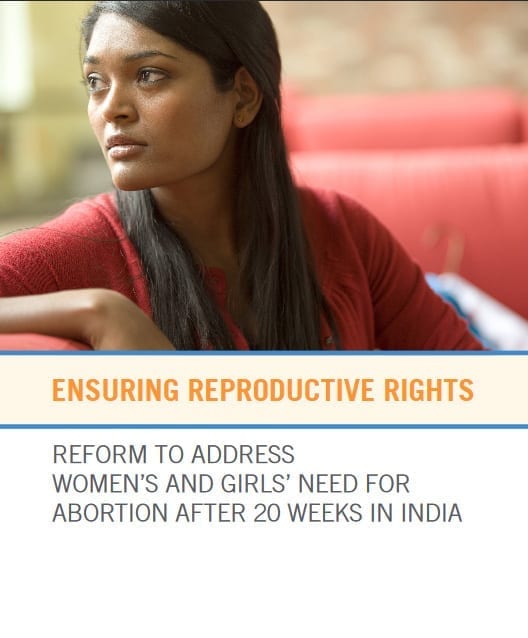It’s time to end judicial authorization for abortion in India
Meera* was only 10 years old when she became pregnant after being raped. Meera did not know she was pregnant, and her family only realized this when she was over 20 weeks along. Although Meera faced grave pregnancy-related risks due to her age and medical history, she was unable to get an abortion due to legal barriers. Meera’s family had to appeal to the district court and then the Supreme Court, where she was subject to multiple medical examinations and intense media scrutiny. After four weeks of delays, Meera was still denied the termination by court-appointed medical boards who failed to properly consider the risks to her health. Meera was told she needed surgery to remove a “large stone” and forced to give birth.
Why would a 10-year-old rape survivor be forced to carry a pregnancy to term, given the obvious risks and dangers? Despite the Medical Termination of Pregnancy Act of 1971, which allows for abortion on several grounds prior to 20 weeks and thereafter when a woman’s life is in danger, there is still a great deal of legal ambiguity which continues to restrict the rights of women and girls across the country.
A recent ruling by the Bombay High Court laid out the conditions in which courts in India can permit women and girls to have abortions after 20 weeks. The decision stated that abortion can now also be legally performed after 20 weeks in cases of risks to the health of a woman. However, to access an abortion under these circumstances, the court has mandated authorization by a court and medical board. This judgment is the latest in a long line of unfortunate decisions from courts in India that has created a de facto requirement that women and girls must file a legal petition and seek judicial permission to undergo abortion on once they cross the statutory limit of 20 weeks except in cases that strictly fall within the life exception. The Court also mandated that in all cases before it, women and girls would be examined by an external medical board (typically consisting of a panel of health care providers that does not include their own physicians) to determine the feasibility of the abortion.
The Court has argued that third-party authorizations are a “necessary safeguard” against abuse and exploitation. However, this perspective fails to consider that a vast majority of Indian women and girls lack financial and legal resources to seek judicial authorization and will be forced to carry an unwanted pregnancy to term or risk their lives through unsafe abortion. The World Health Organisation has called to a third-party authorisation, observing that “negotiating authorization procedures disproportionally burdens poor women, adolescents, those with little education and those subjected to, or at risk of, domestic conflict and violence, creating inequality in access.” Furthermore, the judicial authorization requirement compounds the numerous existing practical and legal barriers to safe abortion in India, such as shortage of registered abortion providers, the stigma around pre-marital sex and abortion, and the widespread misconception that abortion is illegal in India.
A recent study by the Center for Reproductive Rights analyzed 35 decisions from Indian courts where women were forced to seek permission to undergo an abortion. The report found that the judicial and medical board authorization requirements endanger women’s and girls’ reproductive rights by leading to delays, denials, public scrutiny and trauma, and a chilling effect on access to abortion even at earlier stages of pregnancy.
UN human rights bodies have repeatedly condemned judicial and medical board authorization requirements for abortion. The Supreme Court of India has also recognized women’s right to reproductive choice and noted that decisions around procreation as protected under the right to privacy, which was reaffirmed in the Bombay High Court’s decision. But how does mandating judicial authorization further the constitutional and international human rights commitment articulated by the Court to respect women’s dignity and autonomy?
In some cases, the judiciary has authorized abortions, but the fact remains that a clear amendment to the law has yet to be made. A draft of the bill was proposed by the Ministry of Health and Family Welfare in October 2014; however, it has been stalled for almost four years. During this time, more than 80 cases have been filed to Indian courts seeking permission for MTP beyond 20 weeks.
Over 17,000 Indian women and their allies, in a recent petition addressed to the Indian Minister of Health, have shared their concern about judicial authorization and joined the call to ensure women’s and girls’ reproductive rights. Third-party authorization violates women’s equality and constitutes a form of discrimination against women. Law reform to address these concerns is desperately needed. The government and the Courts must repeal patriarchal third-party authorization requirements and adopt laws that recognize and respect the autonomy of every Indian woman and girl to make decisions about her own body and her sexual and reproductive health.
*name has been changed to protect identity
Payal Shah is Acting Regional Director for Asia at the Center for Reproductive Rights

